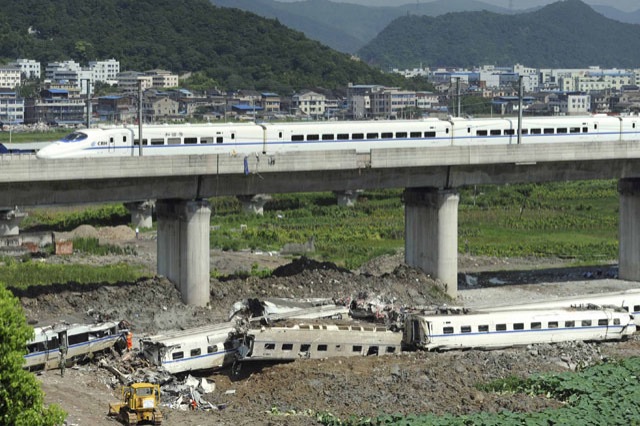[h=1]Did SMRT and LTA hide defects of China manufactured trains?[/h]
By
Terry Xu on July 5, 2016
Current Affairs
FactWire News Agency, a watchdog news organization has just released
an exclusive report on 35 train carriages belonging to local train operator, SMRT Trains Ltd (SMRT) being shipped back to its manufacturer on 12 June due to alleged existing defects.
In its report, FactWire verified and documented the whole transportation after being tipped off by a mainland source in the railway industry that SMRT was secretly shipping defective trains back to mainland China for replacement and repair by manufacturer CSR Sifang Locomotive & Rolling Stock Company Ltd (CSR Sifang).
After witnessing the transportation of carriages from SMRT's Bishan Deport escorted by police cars and construction vehicles. FactWire further confirmed that the carriages were indeed shipped to the manufacturer after visiting the factory of train manufacturer CSR Sifang, located in Qingdao's Chengyang district. Outside the factory, FactWire's reporters saw trains wrapped in green covering identical to the kind seen in Singapore with some of the covering spotting the same wordings.
Manufacturing contract awarded to second lowest bidder by LTA after comprehensive evaluation based on product quality
FactWire writes, "The defective trains belong to the SMRT’s C151A series. In May 2009, Singapore’s Land Transport Authority awarded the manufacturing contract of the C151A trains to a consortium consisting of Japanese company Kawasaki Heavy Industries Rolling Stock Company (Kawasaki Heavy Industries), its Singapore subsidiary, and CSR Sifang. 22 trains were ordered, totalling S$368 million, equivalent to approximately HK$2.1 billion. Singapore later ordered an extra 13 trains of the same series in 2011. From May 2011 to 2014, 35 trains were shipped to Singapore and put into service."
It was said that the Singapore railway contract bid submitted by Kawasaki Heavy Industries-CSR Sifang was the second lowest, with the lowest bid being submitted by a South Korean company and that the Singaporean authorities chose to award the bid to Kawasaki Heavy Industries-CSR Sifang after a comprehensive evaluation because product quality was important to them.
The contract was valued at an approximate value of S$368 million.
SMRT suspected malfunctions was due to defective trains since 2011
FactWire reports that multiple sources from mainland China and Singapore confirmed that problems have been found with C151A trains since they began service in 2011. Its sources said the trains are of poor quality and that the glass next to passenger seats has repeatedly shattered due to shoddy workmanship.
In 2011, one of the trains’ Chinese-made uninterruptible power supply batteries exploded during repair. While there were no injuries, Kawasaki Heavy Industries-CSR Sifang replaced all of the batteries made in China with ones made in Germany.
C151, the predecessor of C151A, has been manufactured by Kawasaki Heavy Industries in Japan since the 1980s. The two models share similar designs, but the C151 has been used by the SMRT since 1987 without experiencing cracks. In December 2011, serious malfunctions occurred on the SMRT’s North South Line, which the SMRT suspected were caused by C151A trains.
FactWire said that a subcontractor responsible for supplying train components to CSR Sifang admitted to them that after the malfunctions, SMRT significantly reduced the frequency of C151A trains and asked to delay payment for extra trains of the same series, greatly impacting the subcontractor’s cash flow.
Its mainland railway industry source further stated that quality issues with the Chinese-made C151A trains began to worsen in 2013. They said cracks were found in structural components, including the sub-floor – a compartment under the passenger floor holding the equipment box and electrical wires – and bolster function parts connecting the car body to the bogie, the latter having the most serious problems.
The source was quoted to say, “It’s a structural problem,”...“The bolster function balances the train’s weight and swing range, [therefore]cracks are dynamic, [they]can spread to the train car body with the bolster function, so the entire train car must be replaced.”
FactWire reported that its mainland sources revealed that impurities have been found in the aluminum train chassis of C151A is a likely cause of the cracks that are found in the train carriages manufactured by CSR Shifang .
Troubling questions from FactWire's report
According to FactWire's report, SMRT is likely to be well aware of the defects that is found in its carriages from the Chinese manufacturer. However, past reports have shown that SMRT has never made known of this to the public.
There have been past incidents on SMRT that has gone largely unexplained, for example, the
case of shattering glass in one of its carriages on 5 June. No further updates on the case by SMRT were given.
If the facts are as what FactWire has reported, one has to shudder at the level of cover up by the company. Even if there may not been any accidents that resulted in injuries due to the defective trains, as a public transport operator, it is gravely irresponsible to have put commuters at risk, who are without any knowledge of the defects
Apart from the company, one has to take a look at how LTA, the governing body of train operators in Singapore has never said anything about the matter. Given that it would be very unlikely that LTA is not informed of the defects by the operator, it sends chill to the bone as to what form of public accountability does the agency and its parent ministry, the Ministry of Transport have towards the general public for allowing such cover-ups.
And given the kind of defects that are found existing in the trains provided by the supplier, it is bewildering to know that LTA is still purchasing trains from the same manufacturer with public taxpayers monies.
Other contracts awarded by LTA to Kawasaki Heavy Industries and CSR Qingdao Sifang
Apart from the earlier contract in 2009, LTA also awarded a contract worth approximately S$749 million to Kawasaki Heavy Industries and CSR Qingdao Sifang for the purchase of 91 new four–car trains for the Thomson and Eastern Region Lines in May 2014. (
LTA's press release - 28 May 2014)
Another twelve new six-car trains for the North-South and East-West Lines (NSEWL) was also purchased from the same consortium at a cost of about S$136.8 million. (
LTA's press release - 22 Sept)
It is unknown if the newly purchased trains have the same underlying defects as the 35 trains that have been sent back.
It has been reported by Straits Times that the defective trains, which are still under warranty, will be repaired by the manufacturer. All 26 trains will be repaired by 2023.
TOC has written to SMRT and LTA for their comments on the story.
SMRT is currently majority owned by the Temasek Holdings, the Singapore investment entity which is chaired by Ho Ching, wife of Lee Hsien Loong, Singapore's Prime Minister and Secretary General of the People's Action Party. Mr Lee's party won 69.9% of the votes in General Election 2015 and remained as the ruling party in Singapore.
Update
In response to media queries, SMRT Trains managing director Lee Ling Wee said: "Our engineers discovered that 26 of the 35 trains delivered by the manufacturer had cracks in the structure connecting the car body and the bogie after they were delivered in 2013."
"Since then, we have been working closely with the Land Transport Authority and the manufacturer to rectify the issue.
"The defective trains, which are still under warranty, will be repaired by the manufacturer. All 26 trains will be repaired by 2023."
LTA posted a response on its Facebook page,
"The Land Transport Authority has been working closely with train manufacturer, Kawasaki Heavy Industries & CSR Sifang, on defects that were found on trains purchased under C151A. These defects, found on the train body, are not safety-critical and do not affect the train’s systems or performance. The train manufacturer will be required to make good the defects as part of their warranty.
Trains on the rail network are extensively tested to ensure the safety and reliability of the train. Every train also undergoes a comprehensive regime of static and dynamic testing as well as interface testing to ensure its structural and operational integrity. After the testing is completed, the trains are delivered to Singapore for further testing before they are placed for passenger service."





 Is it with the tracks, trains, or signaling system
Is it with the tracks, trains, or signaling system Or is it with the management?
Or is it with the management?Is it with the tracks, trains, or signaling system
Or is it with the management?


